University Residential Trip: A Reflective Essay on Experiences
VerifiedAdded on 2023/01/17
|12
|3698
|75
Essay
AI Summary
This reflective essay details a student's experience on a residential trip, focusing on the student's perspective as a visually impaired individual. The essay analyzes the student's performance on various personality tests, including emotional intelligence, Myers-Briggs, Barrett Values, Big Five, and a simple personality test, and how these results correlate with their experiences during the trip. It describes the different tasks undertaken as part of the residential trip, such as the sheep and shepherd, number cruncher, maze task, puzzle bridge, carrying cane, and pipe hurdles, and the student's performance in each. The essay also discusses the student's emotional reactions and challenges faced during the tasks, highlighting the role of teamwork, communication, and individual strengths and weaknesses. The student reflects on their self-awareness, exploring how their personality traits influenced their performance and interactions with others, and the journey of self-discovery throughout the residential trip. The essay provides a detailed account of the student's reflections on their experiences, focusing on their strengths, weaknesses, and personal growth.
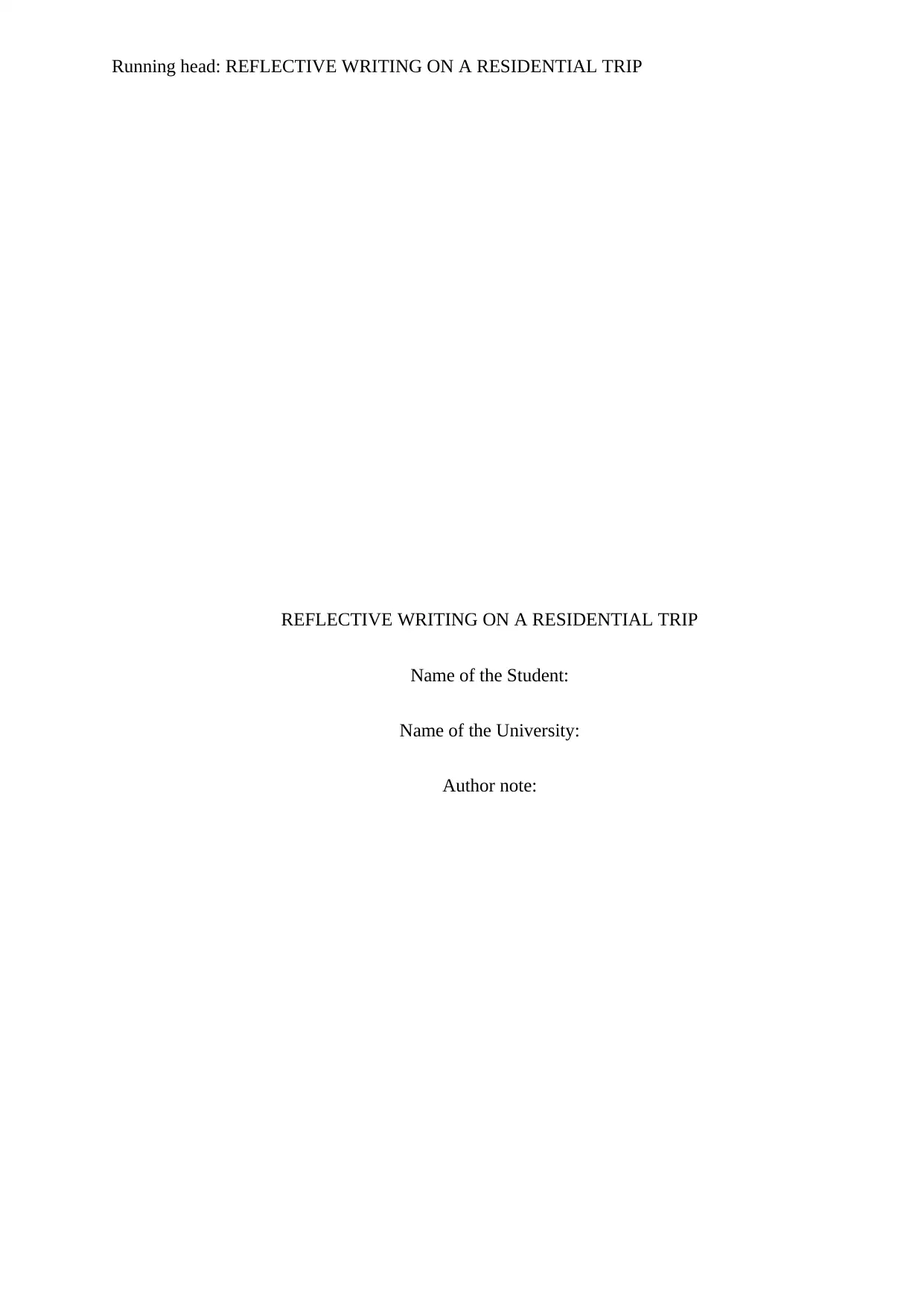
Running head: REFLECTIVE WRITING ON A RESIDENTIAL TRIP
REFLECTIVE WRITING ON A RESIDENTIAL TRIP
Name of the Student:
Name of the University:
Author note:
REFLECTIVE WRITING ON A RESIDENTIAL TRIP
Name of the Student:
Name of the University:
Author note:
Paraphrase This Document
Need a fresh take? Get an instant paraphrase of this document with our AI Paraphraser
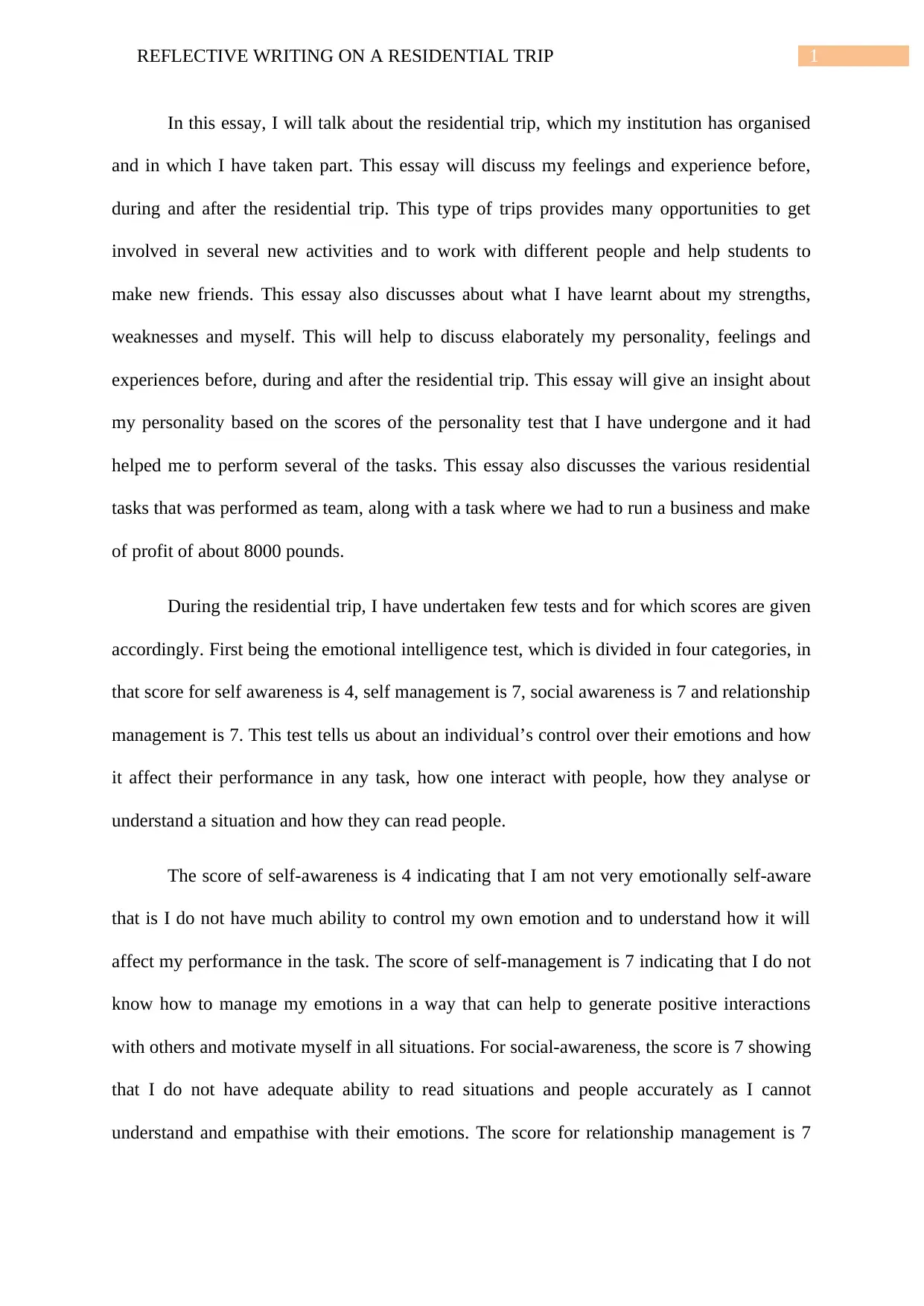
1REFLECTIVE WRITING ON A RESIDENTIAL TRIP
In this essay, I will talk about the residential trip, which my institution has organised
and in which I have taken part. This essay will discuss my feelings and experience before,
during and after the residential trip. This type of trips provides many opportunities to get
involved in several new activities and to work with different people and help students to
make new friends. This essay also discusses about what I have learnt about my strengths,
weaknesses and myself. This will help to discuss elaborately my personality, feelings and
experiences before, during and after the residential trip. This essay will give an insight about
my personality based on the scores of the personality test that I have undergone and it had
helped me to perform several of the tasks. This essay also discusses the various residential
tasks that was performed as team, along with a task where we had to run a business and make
of profit of about 8000 pounds.
During the residential trip, I have undertaken few tests and for which scores are given
accordingly. First being the emotional intelligence test, which is divided in four categories, in
that score for self awareness is 4, self management is 7, social awareness is 7 and relationship
management is 7. This test tells us about an individual’s control over their emotions and how
it affect their performance in any task, how one interact with people, how they analyse or
understand a situation and how they can read people.
The score of self-awareness is 4 indicating that I am not very emotionally self-aware
that is I do not have much ability to control my own emotion and to understand how it will
affect my performance in the task. The score of self-management is 7 indicating that I do not
know how to manage my emotions in a way that can help to generate positive interactions
with others and motivate myself in all situations. For social-awareness, the score is 7 showing
that I do not have adequate ability to read situations and people accurately as I cannot
understand and empathise with their emotions. The score for relationship management is 7
In this essay, I will talk about the residential trip, which my institution has organised
and in which I have taken part. This essay will discuss my feelings and experience before,
during and after the residential trip. This type of trips provides many opportunities to get
involved in several new activities and to work with different people and help students to
make new friends. This essay also discusses about what I have learnt about my strengths,
weaknesses and myself. This will help to discuss elaborately my personality, feelings and
experiences before, during and after the residential trip. This essay will give an insight about
my personality based on the scores of the personality test that I have undergone and it had
helped me to perform several of the tasks. This essay also discusses the various residential
tasks that was performed as team, along with a task where we had to run a business and make
of profit of about 8000 pounds.
During the residential trip, I have undertaken few tests and for which scores are given
accordingly. First being the emotional intelligence test, which is divided in four categories, in
that score for self awareness is 4, self management is 7, social awareness is 7 and relationship
management is 7. This test tells us about an individual’s control over their emotions and how
it affect their performance in any task, how one interact with people, how they analyse or
understand a situation and how they can read people.
The score of self-awareness is 4 indicating that I am not very emotionally self-aware
that is I do not have much ability to control my own emotion and to understand how it will
affect my performance in the task. The score of self-management is 7 indicating that I do not
know how to manage my emotions in a way that can help to generate positive interactions
with others and motivate myself in all situations. For social-awareness, the score is 7 showing
that I do not have adequate ability to read situations and people accurately as I cannot
understand and empathise with their emotions. The score for relationship management is 7
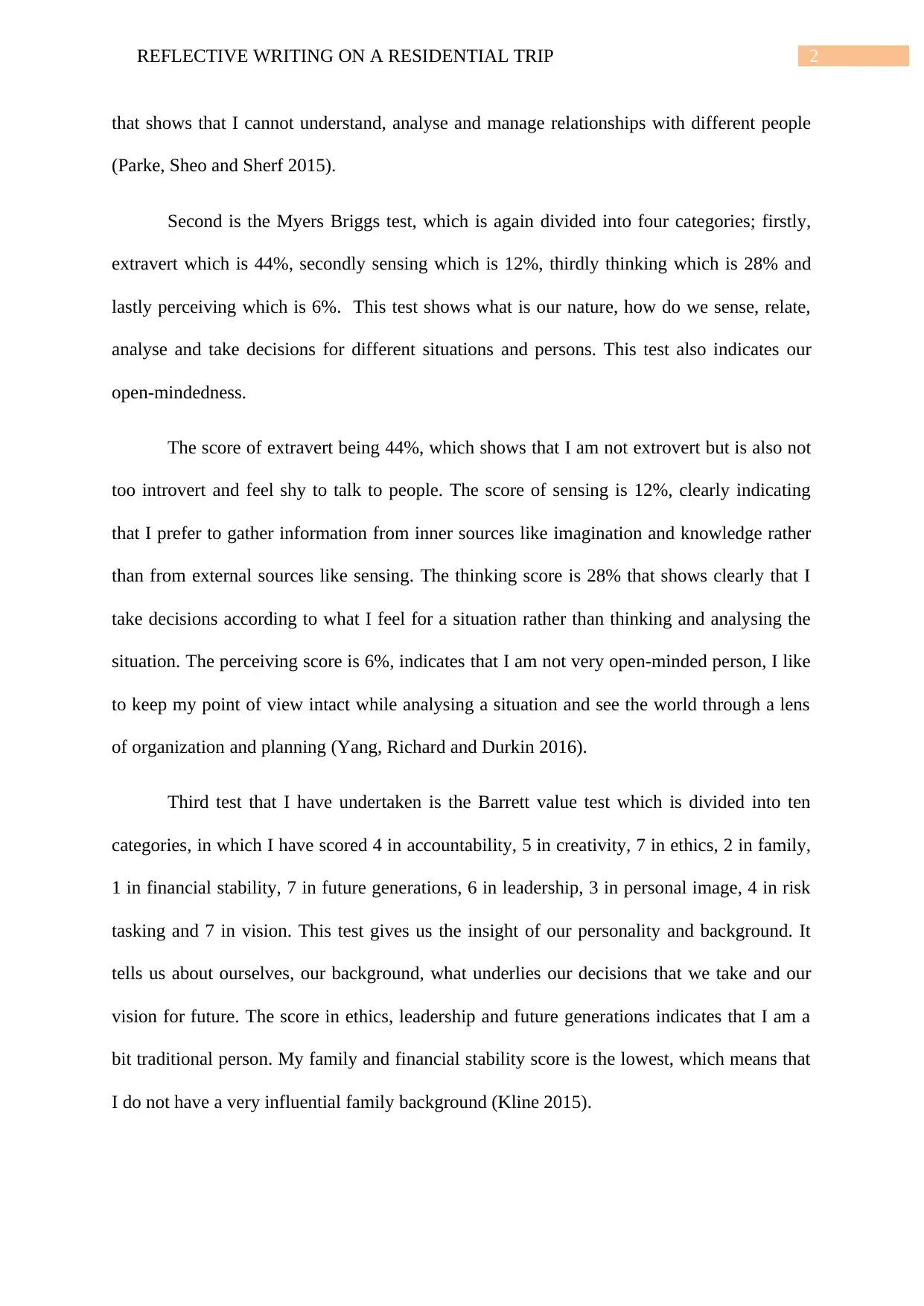
2REFLECTIVE WRITING ON A RESIDENTIAL TRIP
that shows that I cannot understand, analyse and manage relationships with different people
(Parke, Sheo and Sherf 2015).
Second is the Myers Briggs test, which is again divided into four categories; firstly,
extravert which is 44%, secondly sensing which is 12%, thirdly thinking which is 28% and
lastly perceiving which is 6%. This test shows what is our nature, how do we sense, relate,
analyse and take decisions for different situations and persons. This test also indicates our
open-mindedness.
The score of extravert being 44%, which shows that I am not extrovert but is also not
too introvert and feel shy to talk to people. The score of sensing is 12%, clearly indicating
that I prefer to gather information from inner sources like imagination and knowledge rather
than from external sources like sensing. The thinking score is 28% that shows clearly that I
take decisions according to what I feel for a situation rather than thinking and analysing the
situation. The perceiving score is 6%, indicates that I am not very open-minded person, I like
to keep my point of view intact while analysing a situation and see the world through a lens
of organization and planning (Yang, Richard and Durkin 2016).
Third test that I have undertaken is the Barrett value test which is divided into ten
categories, in which I have scored 4 in accountability, 5 in creativity, 7 in ethics, 2 in family,
1 in financial stability, 7 in future generations, 6 in leadership, 3 in personal image, 4 in risk
tasking and 7 in vision. This test gives us the insight of our personality and background. It
tells us about ourselves, our background, what underlies our decisions that we take and our
vision for future. The score in ethics, leadership and future generations indicates that I am a
bit traditional person. My family and financial stability score is the lowest, which means that
I do not have a very influential family background (Kline 2015).
that shows that I cannot understand, analyse and manage relationships with different people
(Parke, Sheo and Sherf 2015).
Second is the Myers Briggs test, which is again divided into four categories; firstly,
extravert which is 44%, secondly sensing which is 12%, thirdly thinking which is 28% and
lastly perceiving which is 6%. This test shows what is our nature, how do we sense, relate,
analyse and take decisions for different situations and persons. This test also indicates our
open-mindedness.
The score of extravert being 44%, which shows that I am not extrovert but is also not
too introvert and feel shy to talk to people. The score of sensing is 12%, clearly indicating
that I prefer to gather information from inner sources like imagination and knowledge rather
than from external sources like sensing. The thinking score is 28% that shows clearly that I
take decisions according to what I feel for a situation rather than thinking and analysing the
situation. The perceiving score is 6%, indicates that I am not very open-minded person, I like
to keep my point of view intact while analysing a situation and see the world through a lens
of organization and planning (Yang, Richard and Durkin 2016).
Third test that I have undertaken is the Barrett value test which is divided into ten
categories, in which I have scored 4 in accountability, 5 in creativity, 7 in ethics, 2 in family,
1 in financial stability, 7 in future generations, 6 in leadership, 3 in personal image, 4 in risk
tasking and 7 in vision. This test gives us the insight of our personality and background. It
tells us about ourselves, our background, what underlies our decisions that we take and our
vision for future. The score in ethics, leadership and future generations indicates that I am a
bit traditional person. My family and financial stability score is the lowest, which means that
I do not have a very influential family background (Kline 2015).
⊘ This is a preview!⊘
Do you want full access?
Subscribe today to unlock all pages.

Trusted by 1+ million students worldwide
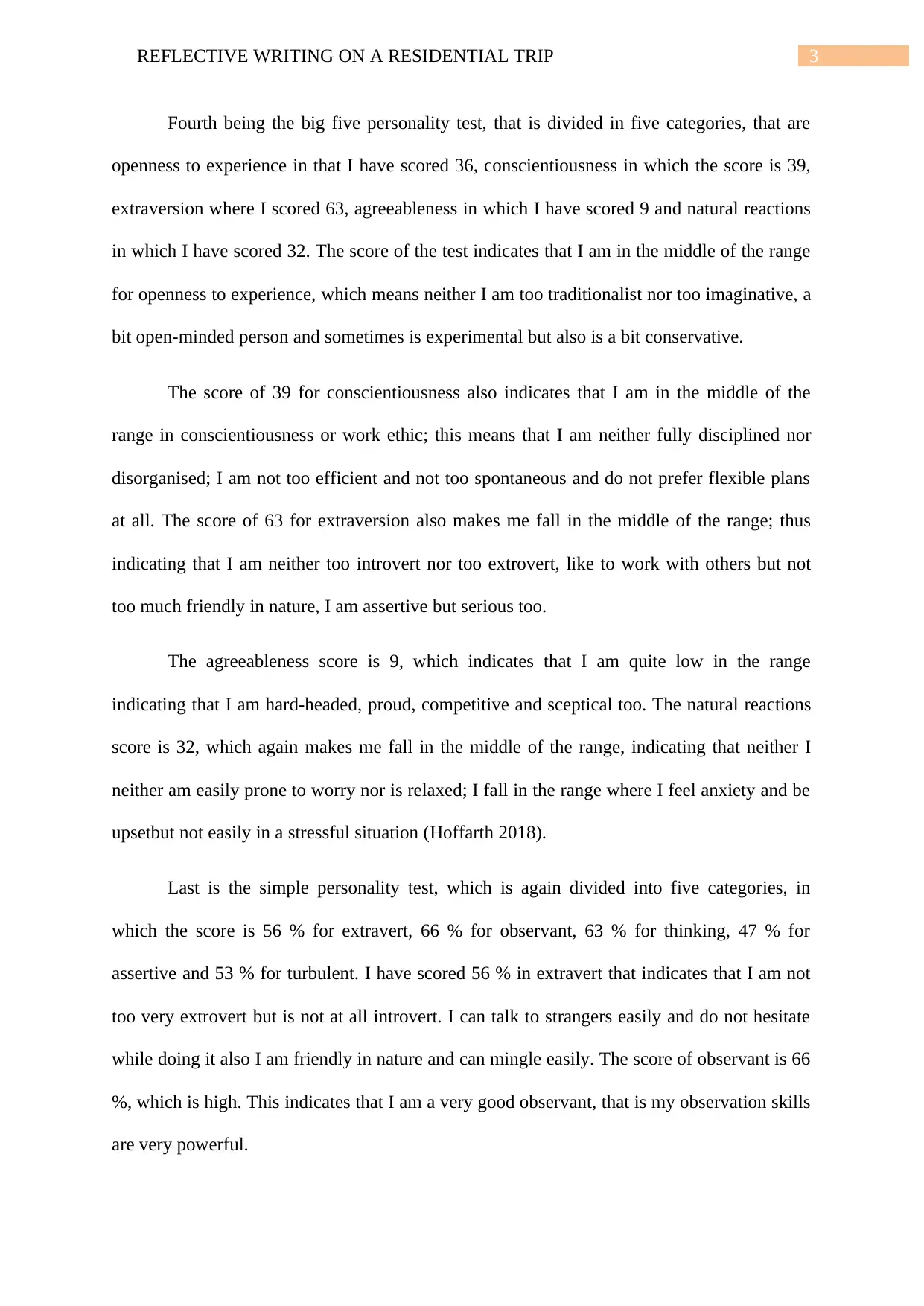
3REFLECTIVE WRITING ON A RESIDENTIAL TRIP
Fourth being the big five personality test, that is divided in five categories, that are
openness to experience in that I have scored 36, conscientiousness in which the score is 39,
extraversion where I scored 63, agreeableness in which I have scored 9 and natural reactions
in which I have scored 32. The score of the test indicates that I am in the middle of the range
for openness to experience, which means neither I am too traditionalist nor too imaginative, a
bit open-minded person and sometimes is experimental but also is a bit conservative.
The score of 39 for conscientiousness also indicates that I am in the middle of the
range in conscientiousness or work ethic; this means that I am neither fully disciplined nor
disorganised; I am not too efficient and not too spontaneous and do not prefer flexible plans
at all. The score of 63 for extraversion also makes me fall in the middle of the range; thus
indicating that I am neither too introvert nor too extrovert, like to work with others but not
too much friendly in nature, I am assertive but serious too.
The agreeableness score is 9, which indicates that I am quite low in the range
indicating that I am hard-headed, proud, competitive and sceptical too. The natural reactions
score is 32, which again makes me fall in the middle of the range, indicating that neither I
neither am easily prone to worry nor is relaxed; I fall in the range where I feel anxiety and be
upsetbut not easily in a stressful situation (Hoffarth 2018).
Last is the simple personality test, which is again divided into five categories, in
which the score is 56 % for extravert, 66 % for observant, 63 % for thinking, 47 % for
assertive and 53 % for turbulent. I have scored 56 % in extravert that indicates that I am not
too very extrovert but is not at all introvert. I can talk to strangers easily and do not hesitate
while doing it also I am friendly in nature and can mingle easily. The score of observant is 66
%, which is high. This indicates that I am a very good observant, that is my observation skills
are very powerful.
Fourth being the big five personality test, that is divided in five categories, that are
openness to experience in that I have scored 36, conscientiousness in which the score is 39,
extraversion where I scored 63, agreeableness in which I have scored 9 and natural reactions
in which I have scored 32. The score of the test indicates that I am in the middle of the range
for openness to experience, which means neither I am too traditionalist nor too imaginative, a
bit open-minded person and sometimes is experimental but also is a bit conservative.
The score of 39 for conscientiousness also indicates that I am in the middle of the
range in conscientiousness or work ethic; this means that I am neither fully disciplined nor
disorganised; I am not too efficient and not too spontaneous and do not prefer flexible plans
at all. The score of 63 for extraversion also makes me fall in the middle of the range; thus
indicating that I am neither too introvert nor too extrovert, like to work with others but not
too much friendly in nature, I am assertive but serious too.
The agreeableness score is 9, which indicates that I am quite low in the range
indicating that I am hard-headed, proud, competitive and sceptical too. The natural reactions
score is 32, which again makes me fall in the middle of the range, indicating that neither I
neither am easily prone to worry nor is relaxed; I fall in the range where I feel anxiety and be
upsetbut not easily in a stressful situation (Hoffarth 2018).
Last is the simple personality test, which is again divided into five categories, in
which the score is 56 % for extravert, 66 % for observant, 63 % for thinking, 47 % for
assertive and 53 % for turbulent. I have scored 56 % in extravert that indicates that I am not
too very extrovert but is not at all introvert. I can talk to strangers easily and do not hesitate
while doing it also I am friendly in nature and can mingle easily. The score of observant is 66
%, which is high. This indicates that I am a very good observant, that is my observation skills
are very powerful.
Paraphrase This Document
Need a fresh take? Get an instant paraphrase of this document with our AI Paraphraser
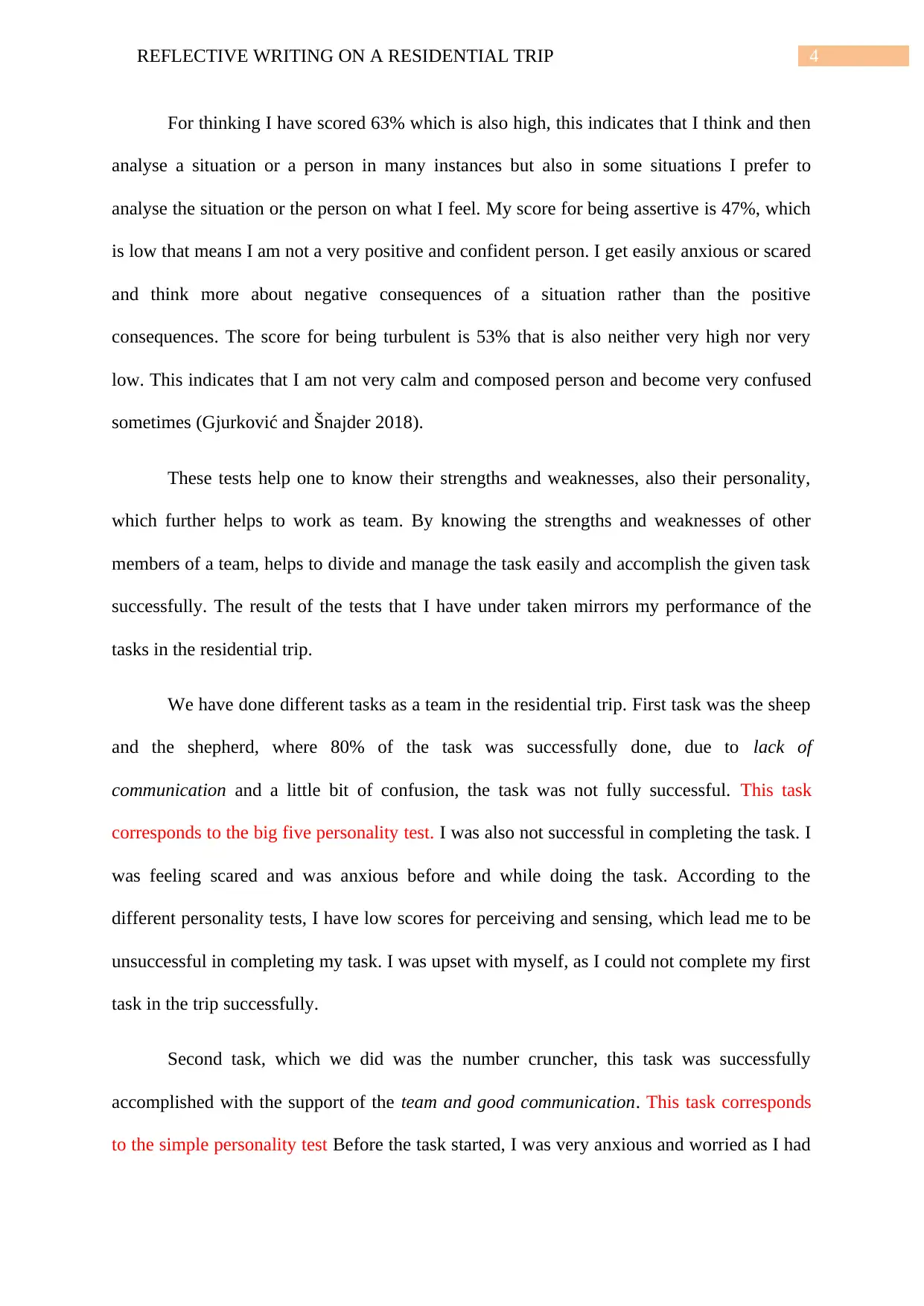
4REFLECTIVE WRITING ON A RESIDENTIAL TRIP
For thinking I have scored 63% which is also high, this indicates that I think and then
analyse a situation or a person in many instances but also in some situations I prefer to
analyse the situation or the person on what I feel. My score for being assertive is 47%, which
is low that means I am not a very positive and confident person. I get easily anxious or scared
and think more about negative consequences of a situation rather than the positive
consequences. The score for being turbulent is 53% that is also neither very high nor very
low. This indicates that I am not very calm and composed person and become very confused
sometimes (Gjurković and Šnajder 2018).
These tests help one to know their strengths and weaknesses, also their personality,
which further helps to work as team. By knowing the strengths and weaknesses of other
members of a team, helps to divide and manage the task easily and accomplish the given task
successfully. The result of the tests that I have under taken mirrors my performance of the
tasks in the residential trip.
We have done different tasks as a team in the residential trip. First task was the sheep
and the shepherd, where 80% of the task was successfully done, due to lack of
communication and a little bit of confusion, the task was not fully successful. This task
corresponds to the big five personality test. I was also not successful in completing the task. I
was feeling scared and was anxious before and while doing the task. According to the
different personality tests, I have low scores for perceiving and sensing, which lead me to be
unsuccessful in completing my task. I was upset with myself, as I could not complete my first
task in the trip successfully.
Second task, which we did was the number cruncher, this task was successfully
accomplished with the support of the team and good communication. This task corresponds
to the simple personality test Before the task started, I was very anxious and worried as I had
For thinking I have scored 63% which is also high, this indicates that I think and then
analyse a situation or a person in many instances but also in some situations I prefer to
analyse the situation or the person on what I feel. My score for being assertive is 47%, which
is low that means I am not a very positive and confident person. I get easily anxious or scared
and think more about negative consequences of a situation rather than the positive
consequences. The score for being turbulent is 53% that is also neither very high nor very
low. This indicates that I am not very calm and composed person and become very confused
sometimes (Gjurković and Šnajder 2018).
These tests help one to know their strengths and weaknesses, also their personality,
which further helps to work as team. By knowing the strengths and weaknesses of other
members of a team, helps to divide and manage the task easily and accomplish the given task
successfully. The result of the tests that I have under taken mirrors my performance of the
tasks in the residential trip.
We have done different tasks as a team in the residential trip. First task was the sheep
and the shepherd, where 80% of the task was successfully done, due to lack of
communication and a little bit of confusion, the task was not fully successful. This task
corresponds to the big five personality test. I was also not successful in completing the task. I
was feeling scared and was anxious before and while doing the task. According to the
different personality tests, I have low scores for perceiving and sensing, which lead me to be
unsuccessful in completing my task. I was upset with myself, as I could not complete my first
task in the trip successfully.
Second task, which we did was the number cruncher, this task was successfully
accomplished with the support of the team and good communication. This task corresponds
to the simple personality test Before the task started, I was very anxious and worried as I had
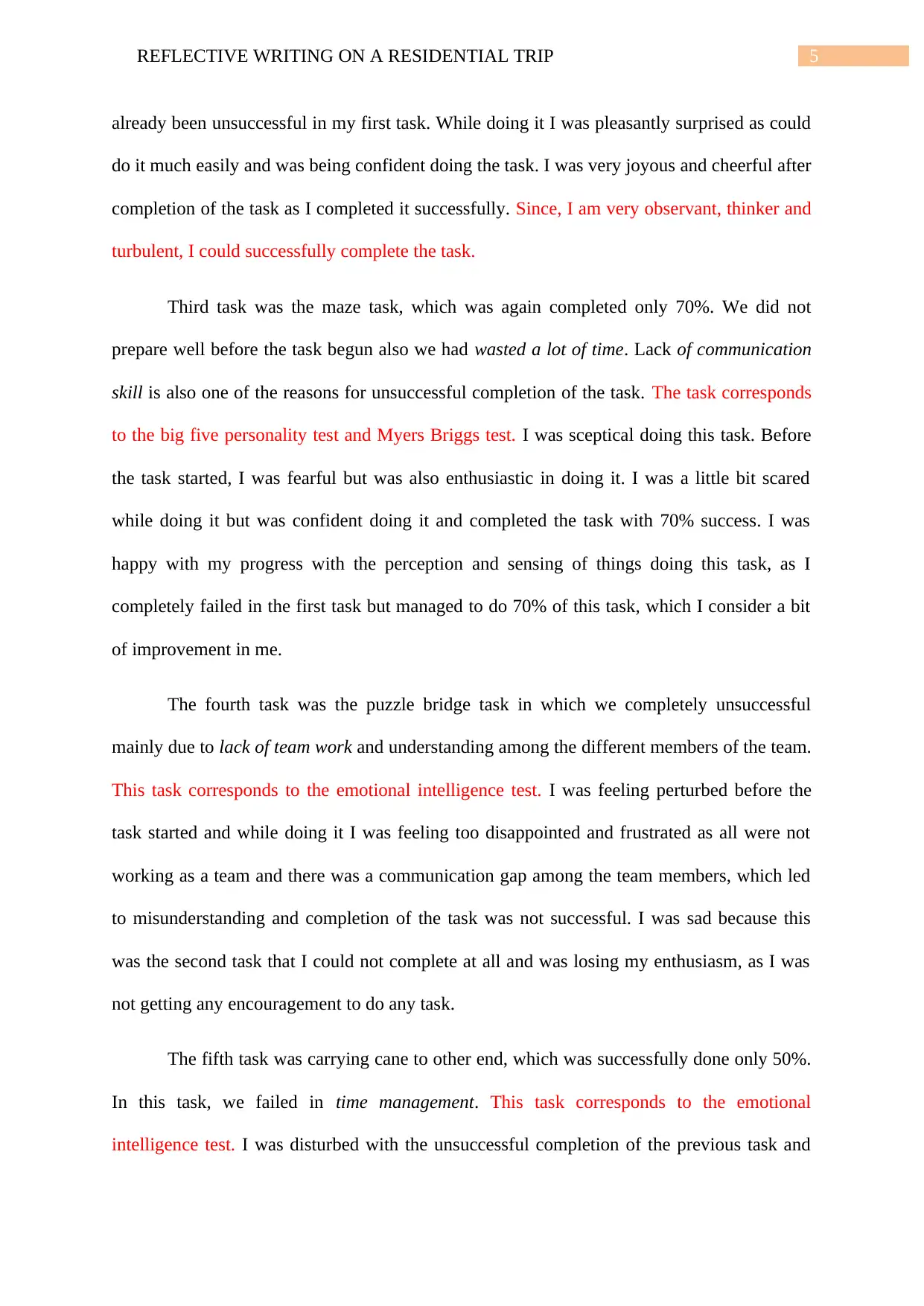
5REFLECTIVE WRITING ON A RESIDENTIAL TRIP
already been unsuccessful in my first task. While doing it I was pleasantly surprised as could
do it much easily and was being confident doing the task. I was very joyous and cheerful after
completion of the task as I completed it successfully. Since, I am very observant, thinker and
turbulent, I could successfully complete the task.
Third task was the maze task, which was again completed only 70%. We did not
prepare well before the task begun also we had wasted a lot of time. Lack of communication
skill is also one of the reasons for unsuccessful completion of the task. The task corresponds
to the big five personality test and Myers Briggs test. I was sceptical doing this task. Before
the task started, I was fearful but was also enthusiastic in doing it. I was a little bit scared
while doing it but was confident doing it and completed the task with 70% success. I was
happy with my progress with the perception and sensing of things doing this task, as I
completely failed in the first task but managed to do 70% of this task, which I consider a bit
of improvement in me.
The fourth task was the puzzle bridge task in which we completely unsuccessful
mainly due to lack of team work and understanding among the different members of the team.
This task corresponds to the emotional intelligence test. I was feeling perturbed before the
task started and while doing it I was feeling too disappointed and frustrated as all were not
working as a team and there was a communication gap among the team members, which led
to misunderstanding and completion of the task was not successful. I was sad because this
was the second task that I could not complete at all and was losing my enthusiasm, as I was
not getting any encouragement to do any task.
The fifth task was carrying cane to other end, which was successfully done only 50%.
In this task, we failed in time management. This task corresponds to the emotional
intelligence test. I was disturbed with the unsuccessful completion of the previous task and
already been unsuccessful in my first task. While doing it I was pleasantly surprised as could
do it much easily and was being confident doing the task. I was very joyous and cheerful after
completion of the task as I completed it successfully. Since, I am very observant, thinker and
turbulent, I could successfully complete the task.
Third task was the maze task, which was again completed only 70%. We did not
prepare well before the task begun also we had wasted a lot of time. Lack of communication
skill is also one of the reasons for unsuccessful completion of the task. The task corresponds
to the big five personality test and Myers Briggs test. I was sceptical doing this task. Before
the task started, I was fearful but was also enthusiastic in doing it. I was a little bit scared
while doing it but was confident doing it and completed the task with 70% success. I was
happy with my progress with the perception and sensing of things doing this task, as I
completely failed in the first task but managed to do 70% of this task, which I consider a bit
of improvement in me.
The fourth task was the puzzle bridge task in which we completely unsuccessful
mainly due to lack of team work and understanding among the different members of the team.
This task corresponds to the emotional intelligence test. I was feeling perturbed before the
task started and while doing it I was feeling too disappointed and frustrated as all were not
working as a team and there was a communication gap among the team members, which led
to misunderstanding and completion of the task was not successful. I was sad because this
was the second task that I could not complete at all and was losing my enthusiasm, as I was
not getting any encouragement to do any task.
The fifth task was carrying cane to other end, which was successfully done only 50%.
In this task, we failed in time management. This task corresponds to the emotional
intelligence test. I was disturbed with the unsuccessful completion of the previous task and
⊘ This is a preview!⊘
Do you want full access?
Subscribe today to unlock all pages.

Trusted by 1+ million students worldwide
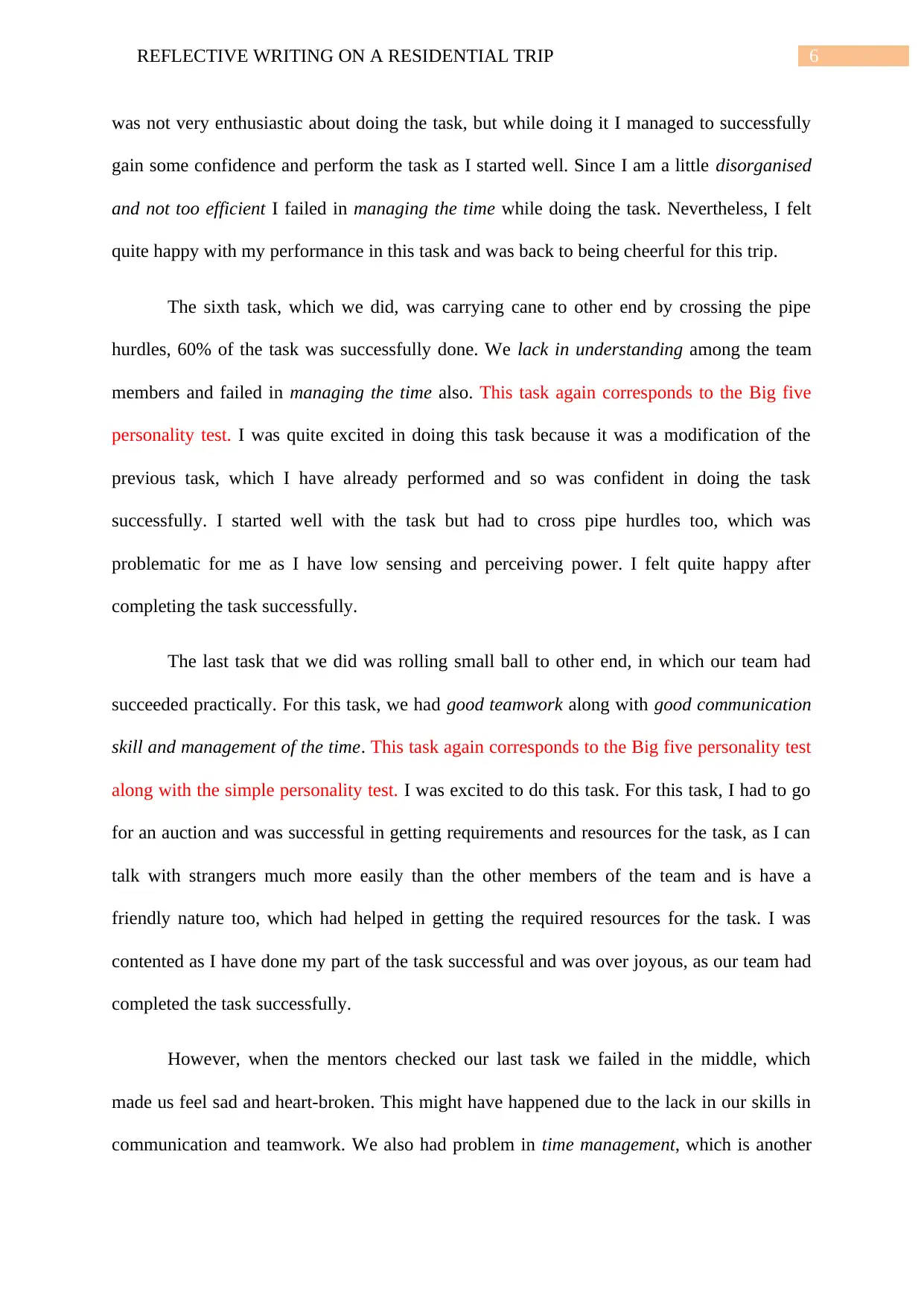
6REFLECTIVE WRITING ON A RESIDENTIAL TRIP
was not very enthusiastic about doing the task, but while doing it I managed to successfully
gain some confidence and perform the task as I started well. Since I am a little disorganised
and not too efficient I failed in managing the time while doing the task. Nevertheless, I felt
quite happy with my performance in this task and was back to being cheerful for this trip.
The sixth task, which we did, was carrying cane to other end by crossing the pipe
hurdles, 60% of the task was successfully done. We lack in understanding among the team
members and failed in managing the time also. This task again corresponds to the Big five
personality test. I was quite excited in doing this task because it was a modification of the
previous task, which I have already performed and so was confident in doing the task
successfully. I started well with the task but had to cross pipe hurdles too, which was
problematic for me as I have low sensing and perceiving power. I felt quite happy after
completing the task successfully.
The last task that we did was rolling small ball to other end, in which our team had
succeeded practically. For this task, we had good teamwork along with good communication
skill and management of the time. This task again corresponds to the Big five personality test
along with the simple personality test. I was excited to do this task. For this task, I had to go
for an auction and was successful in getting requirements and resources for the task, as I can
talk with strangers much more easily than the other members of the team and is have a
friendly nature too, which had helped in getting the required resources for the task. I was
contented as I have done my part of the task successful and was over joyous, as our team had
completed the task successfully.
However, when the mentors checked our last task we failed in the middle, which
made us feel sad and heart-broken. This might have happened due to the lack in our skills in
communication and teamwork. We also had problem in time management, which is another
was not very enthusiastic about doing the task, but while doing it I managed to successfully
gain some confidence and perform the task as I started well. Since I am a little disorganised
and not too efficient I failed in managing the time while doing the task. Nevertheless, I felt
quite happy with my performance in this task and was back to being cheerful for this trip.
The sixth task, which we did, was carrying cane to other end by crossing the pipe
hurdles, 60% of the task was successfully done. We lack in understanding among the team
members and failed in managing the time also. This task again corresponds to the Big five
personality test. I was quite excited in doing this task because it was a modification of the
previous task, which I have already performed and so was confident in doing the task
successfully. I started well with the task but had to cross pipe hurdles too, which was
problematic for me as I have low sensing and perceiving power. I felt quite happy after
completing the task successfully.
The last task that we did was rolling small ball to other end, in which our team had
succeeded practically. For this task, we had good teamwork along with good communication
skill and management of the time. This task again corresponds to the Big five personality test
along with the simple personality test. I was excited to do this task. For this task, I had to go
for an auction and was successful in getting requirements and resources for the task, as I can
talk with strangers much more easily than the other members of the team and is have a
friendly nature too, which had helped in getting the required resources for the task. I was
contented as I have done my part of the task successful and was over joyous, as our team had
completed the task successfully.
However, when the mentors checked our last task we failed in the middle, which
made us feel sad and heart-broken. This might have happened due to the lack in our skills in
communication and teamwork. We also had problem in time management, which is another
Paraphrase This Document
Need a fresh take? Get an instant paraphrase of this document with our AI Paraphraser
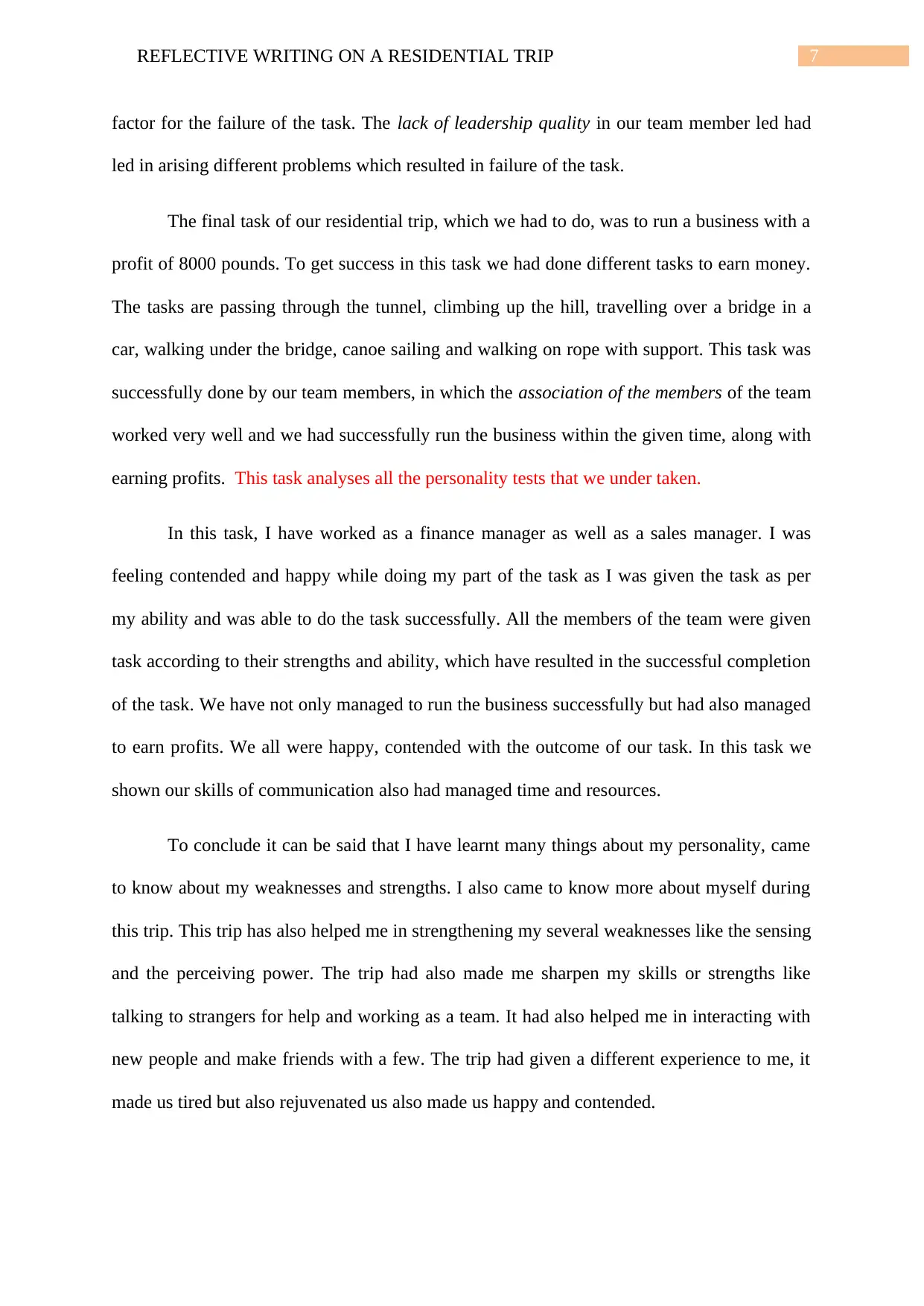
7REFLECTIVE WRITING ON A RESIDENTIAL TRIP
factor for the failure of the task. The lack of leadership quality in our team member led had
led in arising different problems which resulted in failure of the task.
The final task of our residential trip, which we had to do, was to run a business with a
profit of 8000 pounds. To get success in this task we had done different tasks to earn money.
The tasks are passing through the tunnel, climbing up the hill, travelling over a bridge in a
car, walking under the bridge, canoe sailing and walking on rope with support. This task was
successfully done by our team members, in which the association of the members of the team
worked very well and we had successfully run the business within the given time, along with
earning profits. This task analyses all the personality tests that we under taken.
In this task, I have worked as a finance manager as well as a sales manager. I was
feeling contended and happy while doing my part of the task as I was given the task as per
my ability and was able to do the task successfully. All the members of the team were given
task according to their strengths and ability, which have resulted in the successful completion
of the task. We have not only managed to run the business successfully but had also managed
to earn profits. We all were happy, contended with the outcome of our task. In this task we
shown our skills of communication also had managed time and resources.
To conclude it can be said that I have learnt many things about my personality, came
to know about my weaknesses and strengths. I also came to know more about myself during
this trip. This trip has also helped me in strengthening my several weaknesses like the sensing
and the perceiving power. The trip had also made me sharpen my skills or strengths like
talking to strangers for help and working as a team. It had also helped me in interacting with
new people and make friends with a few. The trip had given a different experience to me, it
made us tired but also rejuvenated us also made us happy and contended.
factor for the failure of the task. The lack of leadership quality in our team member led had
led in arising different problems which resulted in failure of the task.
The final task of our residential trip, which we had to do, was to run a business with a
profit of 8000 pounds. To get success in this task we had done different tasks to earn money.
The tasks are passing through the tunnel, climbing up the hill, travelling over a bridge in a
car, walking under the bridge, canoe sailing and walking on rope with support. This task was
successfully done by our team members, in which the association of the members of the team
worked very well and we had successfully run the business within the given time, along with
earning profits. This task analyses all the personality tests that we under taken.
In this task, I have worked as a finance manager as well as a sales manager. I was
feeling contended and happy while doing my part of the task as I was given the task as per
my ability and was able to do the task successfully. All the members of the team were given
task according to their strengths and ability, which have resulted in the successful completion
of the task. We have not only managed to run the business successfully but had also managed
to earn profits. We all were happy, contended with the outcome of our task. In this task we
shown our skills of communication also had managed time and resources.
To conclude it can be said that I have learnt many things about my personality, came
to know about my weaknesses and strengths. I also came to know more about myself during
this trip. This trip has also helped me in strengthening my several weaknesses like the sensing
and the perceiving power. The trip had also made me sharpen my skills or strengths like
talking to strangers for help and working as a team. It had also helped me in interacting with
new people and make friends with a few. The trip had given a different experience to me, it
made us tired but also rejuvenated us also made us happy and contended.
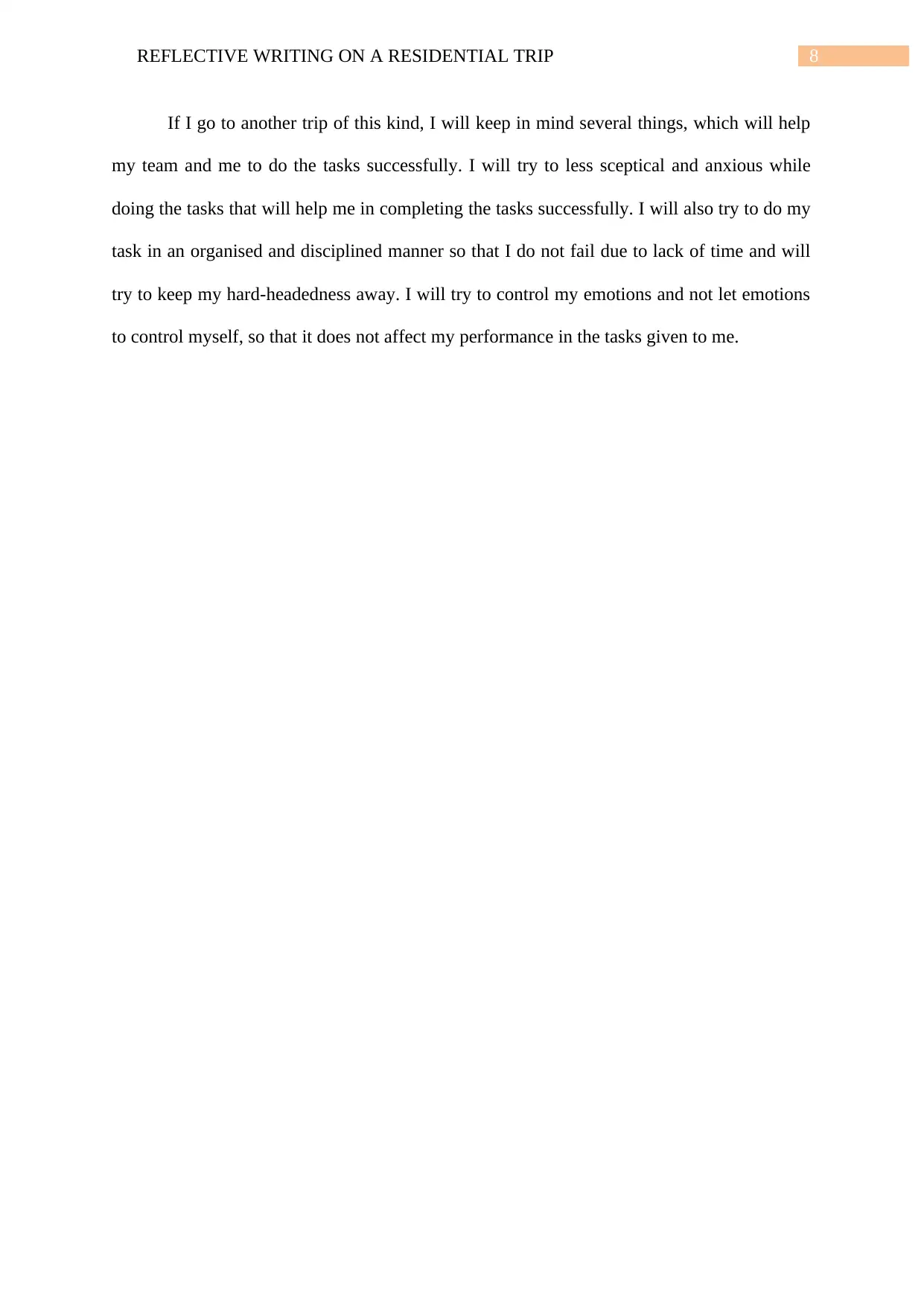
8REFLECTIVE WRITING ON A RESIDENTIAL TRIP
If I go to another trip of this kind, I will keep in mind several things, which will help
my team and me to do the tasks successfully. I will try to less sceptical and anxious while
doing the tasks that will help me in completing the tasks successfully. I will also try to do my
task in an organised and disciplined manner so that I do not fail due to lack of time and will
try to keep my hard-headedness away. I will try to control my emotions and not let emotions
to control myself, so that it does not affect my performance in the tasks given to me.
If I go to another trip of this kind, I will keep in mind several things, which will help
my team and me to do the tasks successfully. I will try to less sceptical and anxious while
doing the tasks that will help me in completing the tasks successfully. I will also try to do my
task in an organised and disciplined manner so that I do not fail due to lack of time and will
try to keep my hard-headedness away. I will try to control my emotions and not let emotions
to control myself, so that it does not affect my performance in the tasks given to me.
⊘ This is a preview!⊘
Do you want full access?
Subscribe today to unlock all pages.

Trusted by 1+ million students worldwide
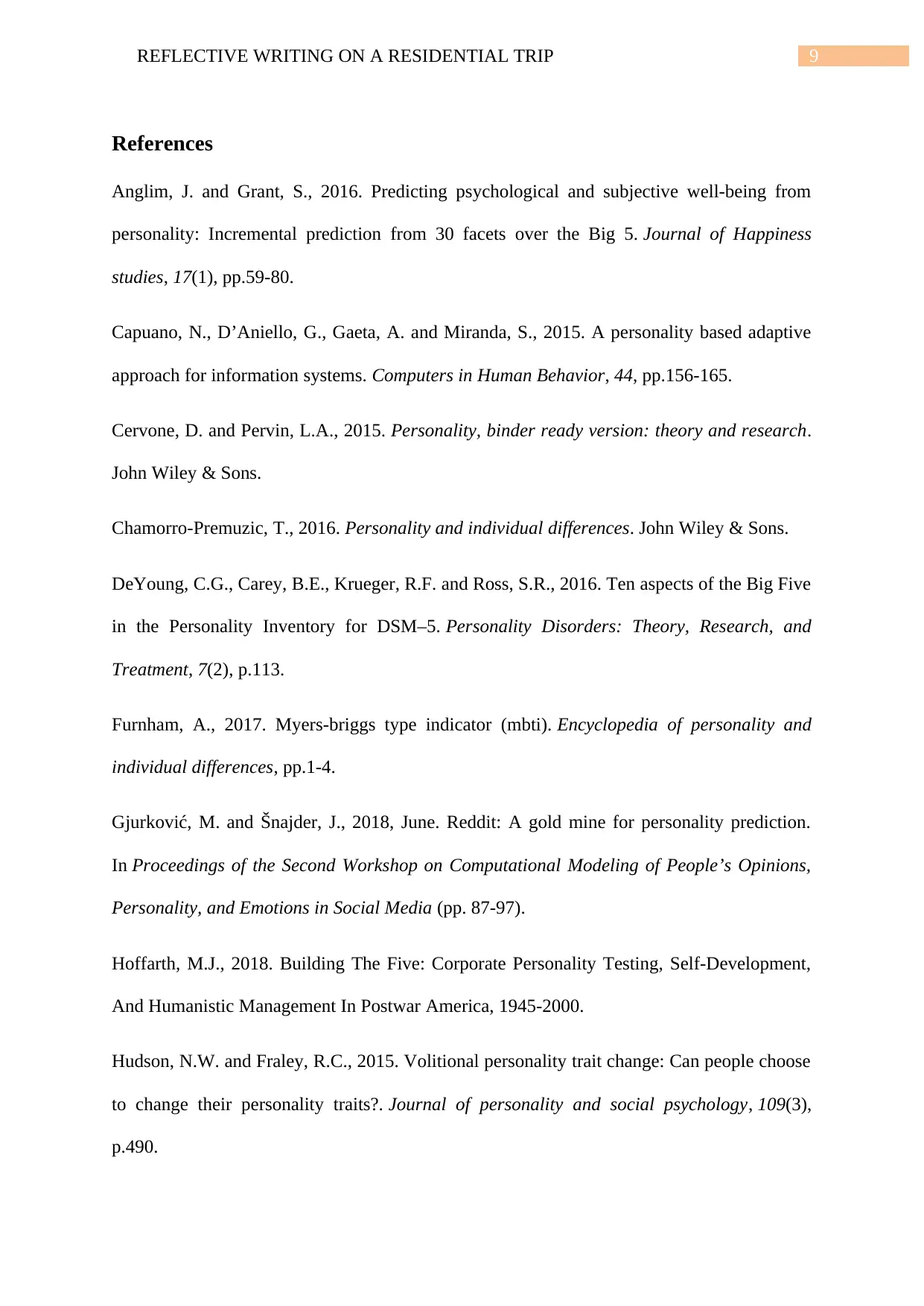
9REFLECTIVE WRITING ON A RESIDENTIAL TRIP
References
Anglim, J. and Grant, S., 2016. Predicting psychological and subjective well-being from
personality: Incremental prediction from 30 facets over the Big 5. Journal of Happiness
studies, 17(1), pp.59-80.
Capuano, N., D’Aniello, G., Gaeta, A. and Miranda, S., 2015. A personality based adaptive
approach for information systems. Computers in Human Behavior, 44, pp.156-165.
Cervone, D. and Pervin, L.A., 2015. Personality, binder ready version: theory and research.
John Wiley & Sons.
Chamorro-Premuzic, T., 2016. Personality and individual differences. John Wiley & Sons.
DeYoung, C.G., Carey, B.E., Krueger, R.F. and Ross, S.R., 2016. Ten aspects of the Big Five
in the Personality Inventory for DSM–5. Personality Disorders: Theory, Research, and
Treatment, 7(2), p.113.
Furnham, A., 2017. Myers-briggs type indicator (mbti). Encyclopedia of personality and
individual differences, pp.1-4.
Gjurković, M. and Šnajder, J., 2018, June. Reddit: A gold mine for personality prediction.
In Proceedings of the Second Workshop on Computational Modeling of People’s Opinions,
Personality, and Emotions in Social Media (pp. 87-97).
Hoffarth, M.J., 2018. Building The Five: Corporate Personality Testing, Self-Development,
And Humanistic Management In Postwar America, 1945-2000.
Hudson, N.W. and Fraley, R.C., 2015. Volitional personality trait change: Can people choose
to change their personality traits?. Journal of personality and social psychology, 109(3),
p.490.
References
Anglim, J. and Grant, S., 2016. Predicting psychological and subjective well-being from
personality: Incremental prediction from 30 facets over the Big 5. Journal of Happiness
studies, 17(1), pp.59-80.
Capuano, N., D’Aniello, G., Gaeta, A. and Miranda, S., 2015. A personality based adaptive
approach for information systems. Computers in Human Behavior, 44, pp.156-165.
Cervone, D. and Pervin, L.A., 2015. Personality, binder ready version: theory and research.
John Wiley & Sons.
Chamorro-Premuzic, T., 2016. Personality and individual differences. John Wiley & Sons.
DeYoung, C.G., Carey, B.E., Krueger, R.F. and Ross, S.R., 2016. Ten aspects of the Big Five
in the Personality Inventory for DSM–5. Personality Disorders: Theory, Research, and
Treatment, 7(2), p.113.
Furnham, A., 2017. Myers-briggs type indicator (mbti). Encyclopedia of personality and
individual differences, pp.1-4.
Gjurković, M. and Šnajder, J., 2018, June. Reddit: A gold mine for personality prediction.
In Proceedings of the Second Workshop on Computational Modeling of People’s Opinions,
Personality, and Emotions in Social Media (pp. 87-97).
Hoffarth, M.J., 2018. Building The Five: Corporate Personality Testing, Self-Development,
And Humanistic Management In Postwar America, 1945-2000.
Hudson, N.W. and Fraley, R.C., 2015. Volitional personality trait change: Can people choose
to change their personality traits?. Journal of personality and social psychology, 109(3),
p.490.
Paraphrase This Document
Need a fresh take? Get an instant paraphrase of this document with our AI Paraphraser
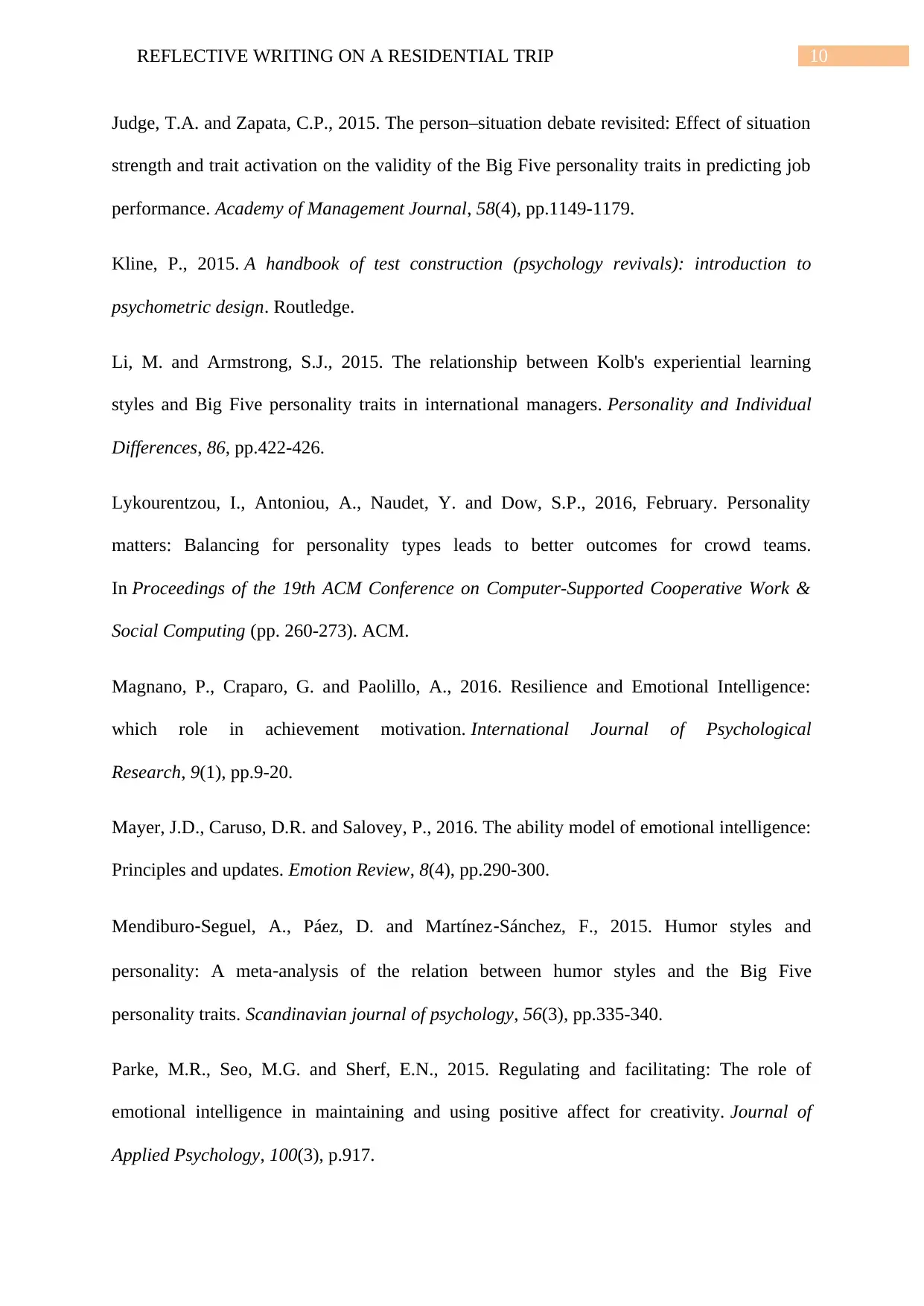
10REFLECTIVE WRITING ON A RESIDENTIAL TRIP
Judge, T.A. and Zapata, C.P., 2015. The person–situation debate revisited: Effect of situation
strength and trait activation on the validity of the Big Five personality traits in predicting job
performance. Academy of Management Journal, 58(4), pp.1149-1179.
Kline, P., 2015. A handbook of test construction (psychology revivals): introduction to
psychometric design. Routledge.
Li, M. and Armstrong, S.J., 2015. The relationship between Kolb's experiential learning
styles and Big Five personality traits in international managers. Personality and Individual
Differences, 86, pp.422-426.
Lykourentzou, I., Antoniou, A., Naudet, Y. and Dow, S.P., 2016, February. Personality
matters: Balancing for personality types leads to better outcomes for crowd teams.
In Proceedings of the 19th ACM Conference on Computer-Supported Cooperative Work &
Social Computing (pp. 260-273). ACM.
Magnano, P., Craparo, G. and Paolillo, A., 2016. Resilience and Emotional Intelligence:
which role in achievement motivation. International Journal of Psychological
Research, 9(1), pp.9-20.
Mayer, J.D., Caruso, D.R. and Salovey, P., 2016. The ability model of emotional intelligence:
Principles and updates. Emotion Review, 8(4), pp.290-300.
Mendiburo‐Seguel, A., Páez, D. and Martínez‐Sánchez, F., 2015. Humor styles and
personality: A meta‐analysis of the relation between humor styles and the Big Five
personality traits. Scandinavian journal of psychology, 56(3), pp.335-340.
Parke, M.R., Seo, M.G. and Sherf, E.N., 2015. Regulating and facilitating: The role of
emotional intelligence in maintaining and using positive affect for creativity. Journal of
Applied Psychology, 100(3), p.917.
Judge, T.A. and Zapata, C.P., 2015. The person–situation debate revisited: Effect of situation
strength and trait activation on the validity of the Big Five personality traits in predicting job
performance. Academy of Management Journal, 58(4), pp.1149-1179.
Kline, P., 2015. A handbook of test construction (psychology revivals): introduction to
psychometric design. Routledge.
Li, M. and Armstrong, S.J., 2015. The relationship between Kolb's experiential learning
styles and Big Five personality traits in international managers. Personality and Individual
Differences, 86, pp.422-426.
Lykourentzou, I., Antoniou, A., Naudet, Y. and Dow, S.P., 2016, February. Personality
matters: Balancing for personality types leads to better outcomes for crowd teams.
In Proceedings of the 19th ACM Conference on Computer-Supported Cooperative Work &
Social Computing (pp. 260-273). ACM.
Magnano, P., Craparo, G. and Paolillo, A., 2016. Resilience and Emotional Intelligence:
which role in achievement motivation. International Journal of Psychological
Research, 9(1), pp.9-20.
Mayer, J.D., Caruso, D.R. and Salovey, P., 2016. The ability model of emotional intelligence:
Principles and updates. Emotion Review, 8(4), pp.290-300.
Mendiburo‐Seguel, A., Páez, D. and Martínez‐Sánchez, F., 2015. Humor styles and
personality: A meta‐analysis of the relation between humor styles and the Big Five
personality traits. Scandinavian journal of psychology, 56(3), pp.335-340.
Parke, M.R., Seo, M.G. and Sherf, E.N., 2015. Regulating and facilitating: The role of
emotional intelligence in maintaining and using positive affect for creativity. Journal of
Applied Psychology, 100(3), p.917.
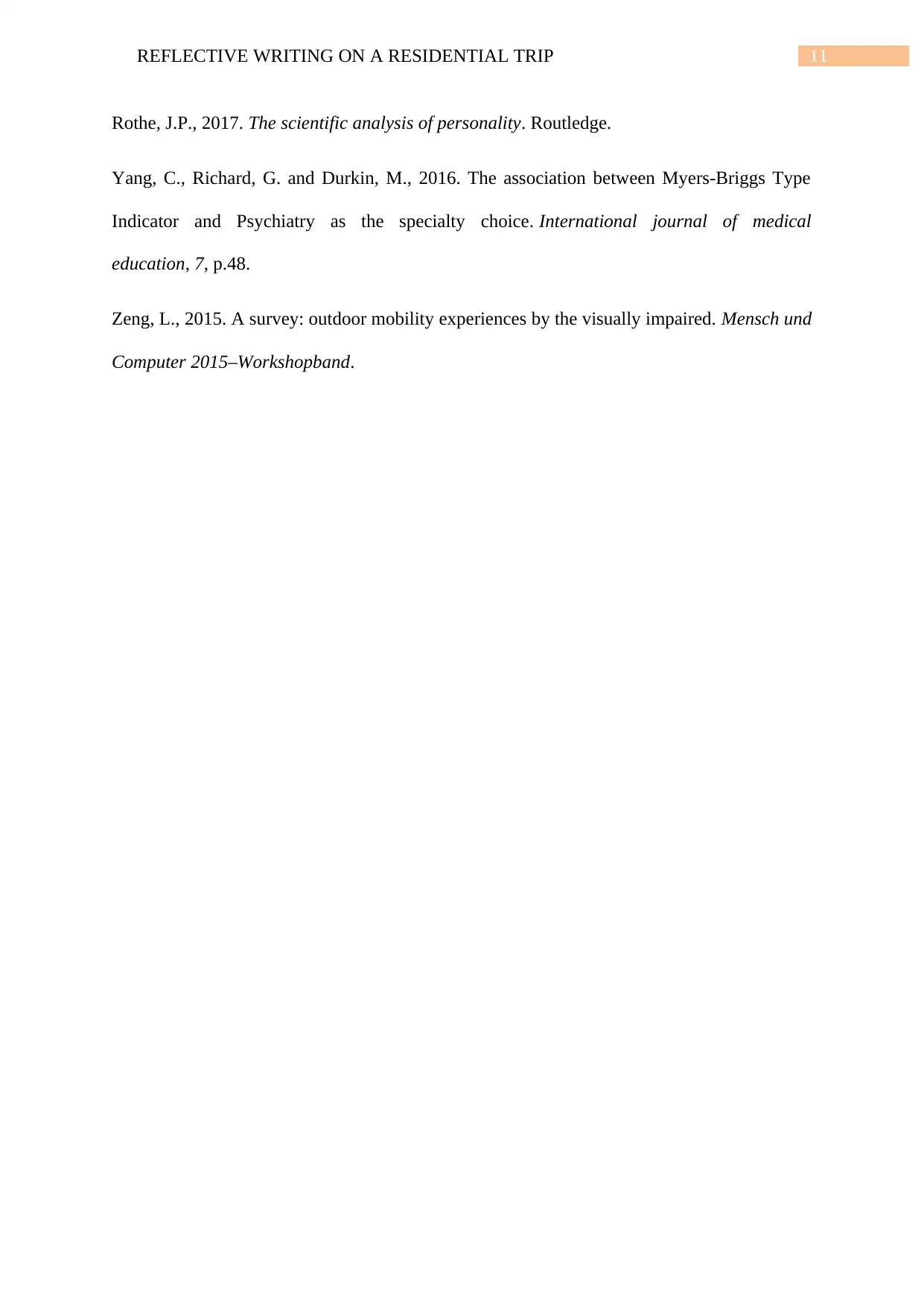
11REFLECTIVE WRITING ON A RESIDENTIAL TRIP
Rothe, J.P., 2017. The scientific analysis of personality. Routledge.
Yang, C., Richard, G. and Durkin, M., 2016. The association between Myers-Briggs Type
Indicator and Psychiatry as the specialty choice. International journal of medical
education, 7, p.48.
Zeng, L., 2015. A survey: outdoor mobility experiences by the visually impaired. Mensch und
Computer 2015–Workshopband.
Rothe, J.P., 2017. The scientific analysis of personality. Routledge.
Yang, C., Richard, G. and Durkin, M., 2016. The association between Myers-Briggs Type
Indicator and Psychiatry as the specialty choice. International journal of medical
education, 7, p.48.
Zeng, L., 2015. A survey: outdoor mobility experiences by the visually impaired. Mensch und
Computer 2015–Workshopband.
⊘ This is a preview!⊘
Do you want full access?
Subscribe today to unlock all pages.

Trusted by 1+ million students worldwide
1 out of 12
Related Documents
Your All-in-One AI-Powered Toolkit for Academic Success.
+13062052269
info@desklib.com
Available 24*7 on WhatsApp / Email
![[object Object]](/_next/static/media/star-bottom.7253800d.svg)
Unlock your academic potential
Copyright © 2020–2025 A2Z Services. All Rights Reserved. Developed and managed by ZUCOL.





